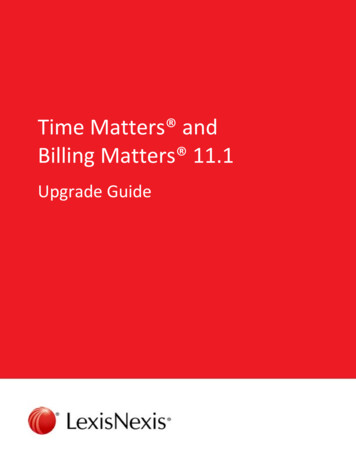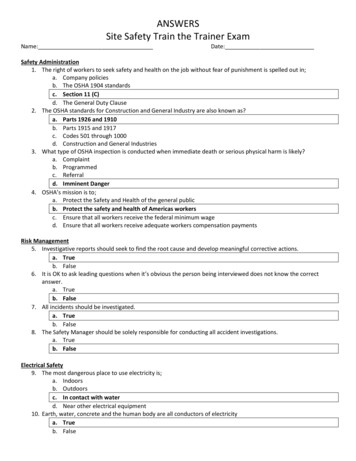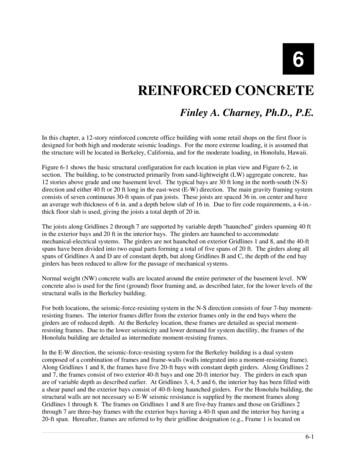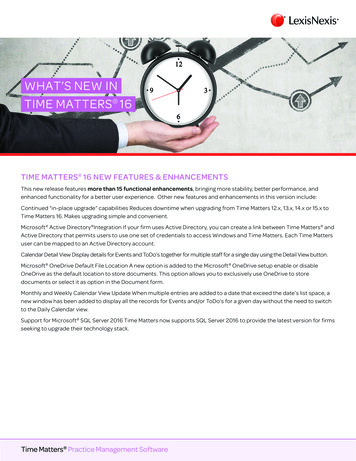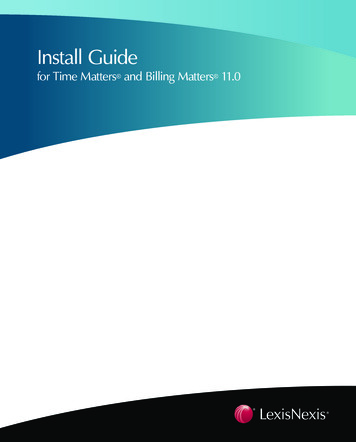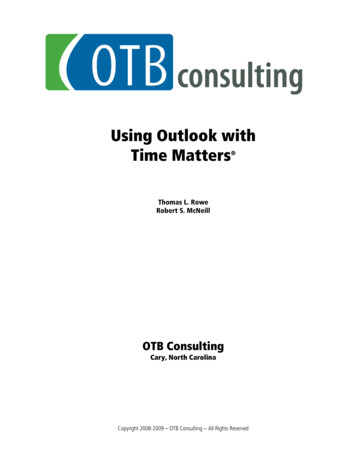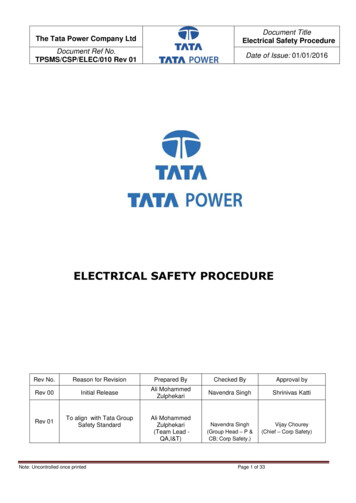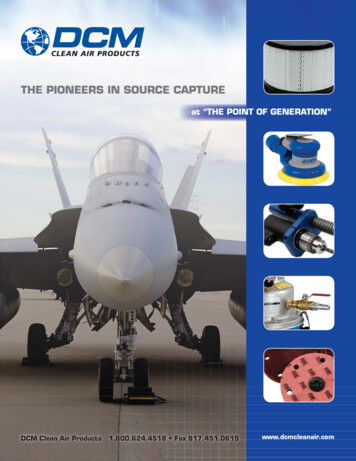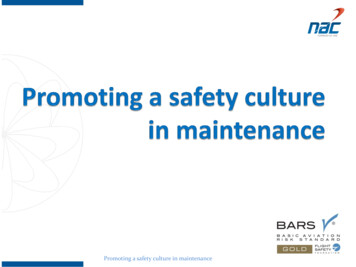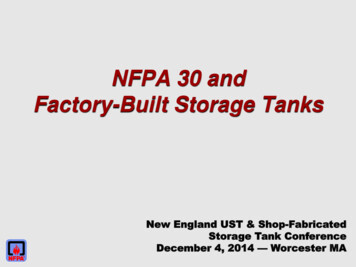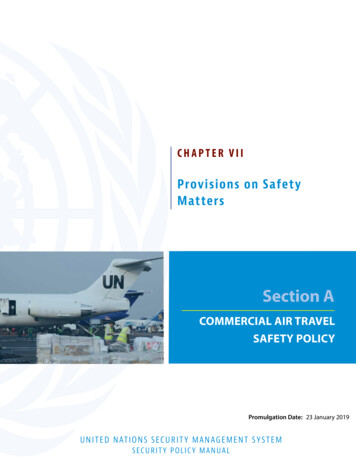
Transcription
CHAPTER VIIProvisions on SafetyMattersSection ACOMMERCIAL AIR TRAVELSAFETY POLICYPromulgation Date: 23 January 2019U N I T E D N AT I O N S S E C U R I T Y M A N A G E M E N T S Y S T E MSECURITY POLICY MANUAL
A. Introduction1. United Nations Security Management System (UNSMS) personnel1 serve in some ofthe most challenging environments in the world, often working in dif@icultconditions while conducting their duties under the mandates, programmes andactivities of their respective organizations.2. Air transport is often the most practical mode of transport for reaching operationalareas, particularly in challenging environments.3. The United Nations system organizations have called for greater coordination topromote the harmonization of air travel management which includes considerationof safety factors in the selection of air operators.B. Purpose4. The purpose of this policy is to provide a system-wide framework to enable dueconsideration of aviation safety factors in the selection of commercial air operators,for of@icial travel of UNSMS personnel.C. Scope5. This policy addresses the consideration of aviation safety factors in the use ofcommercial air operators and donated @lights for of@icial travel. It does not addressUN chartered @lights or air transport services procured, designed and operated forspeci@ic purposes (e.g. CASEVAC/MEDEVAC).6. Aviation security2 is outside the scope and not addressed in this policy.D. Applicability7. The policy is applicable to all UNSMS entities and all individuals covered by theUNSMS, as de@ined in Chapter III of the Security Policy Manual “Applicability of theUnited Nations Security Management System”. Such individuals shall herein bereferred to as “personnel”.E. De8initions1See Security Policy Manual, Chapter III, Section B “Applicability of the United Nations Security ManagementSystem” for definition of United Nations personnel.2 AviationSecurity refers to human and material resources used to safeguard civil aviation against unlawfulinterference. These include techniques and methods to protect aerodromes, passengers, employees, equipment andaircraft from accidental/malicious harm, crime and other threats.2
8. Aviation Safety – For the purposes of this policy, aviation safety is the reliability of anair operator to function without safety-related incident (non-deliberate event).39. Commercial Air Operator – An operator, with a valid Air Operator Certi@icate (AOC)issued by the State of the operator,4 which, for remuneration or hire, providesscheduled or non-scheduled5 air transport services to the public for the carriage ofpassengers.10. UN Chartered Flights – Air transport procured under contractual arrangementbetween an air operator and a UN organization for the sole purpose of providingshort-term or long-term services to support UN-mandated activities.11. Donated Flight – Flight provided without charge to one or more UNSMS entities forof@icial travel. Such a @light may be operated by a commercial air operator, by aprivate operator or by a civilian, government or military entity of a member state.F. Information, Analysis and Assessment12. The process for the provision of aviation safety information and analysis ofcommercial air operators and commercially operated donated @lights is as follows:a. The Commercial Air Travel Safety Unit (CATSU) in UNDSS collects andcollates relevant information from specialized industry sources;b. CATSU analyses the information, based on advice provided by theAviation Technical Advisory Group (ATAG),6 and establishes a list ofcommercial air operators that are recommended for of@icial travel ofpersonnel within the UNSMS;c. Through the United Nations Security Management Information Network(UNSMIN),7 CATSU communicates the list of recommended commercialair operators to the most senior security professional advising the DO8 in3The International Civil Aviation Organization (ICAO) de@ines safety as “The state in which risks associatedwith aviation activities, related to, or in direct support of the operation of aircraft, are reduced and controlledto an acceptable level.” Reference ICAO Annex 19 Safety Management and Universal Safety Oversight AuditProgramme Continuous Monitoring Manual (Doc 9735).4Normally under the direction of a civil aviation authority or equivalent body.5 Non-scheduledair transport excluding charter.6 Aninter-agency group established by the General Assembly consisting of aviation specialists from UN Departmentof Operational Support (DOS) and the World Food Programme (WFP) with the International Civil AviationOrganization (ICAO) in an advisory capacity.7 A webportal accessible to UN managers with security responsibilities and UN security professionals that providesaccess to UNDSS systems.8Principal/Chief/Security Advisers and Country Security Focal Points in their absence.3
the @ield and to the focal point(s) nominated by UNSMS entities (seeParagraph 17.b);d. The focal point(s) in each UNSMS entity, in turn, shares the list internallywith decision-makers and with UNSMS contractors subject tocon@identiality requirements indicated in Paragraph 23; ande. UNSMS entities may, at their sole discretion and through their focalpoints, request CATSU to provide information, analysis and advice on theuse of speci@ic commercially operated donated @lights. Upon request andsubject to the availability of information, CATSU provides suchinformation, analysis and advice.13. CATSU may have information on commercial air operators that are not on therecommended list. This information will be summarized and provided by CATSU toUNSMS entities upon request. This information will not alter the UNSMS list ofrecommended air operators.14. Taking account of the information and analysis provided by CATSU, decision-makingfor the use of a commercial air operator or commercially operated donated @light ismade by each UNSMS entity for their personnel. For circumstances where norecommended commercial air operator exists, UNSMS entities should considerwhether:a.b.c.d.To avail of an air operator that is not on the recommended list;To use existing alternative modes of travel such as road travel;Existing UN air assets may be used, subject to availability;A chartered @light is feasible, taking account of advice from UN aviationspecialists involved in the provision of air transport services through aircharter agreements;9e. To request CATSU to reconsider the analysis through an expandedtechnical review; orf. To request CATSU to initiate and coordinate an on-the-ground assessmentfor required routes, with a view to providing additional information toCATSU for inclusion in its analyses and recommendations.15. CATSU can initiate expanded technical reviews and on-the-ground assessments. Inall cases, CATSU determines the feasibility of an on-the-ground assessment of acommercial air operator based on inter alia, the cost-bene@it of such an assessment,the agreement of governmental authorities and the commercial air operator to beassessed, the availability of a UN aviation specialist, and the availability of funds.16. CATSU includes the results of the assessment in its analyses and communicates anychanges to the list of recommended commercial air operators to UNSMS entities9The Department of Operational Support (DOS) and the World Food Programme (WFP).4
through their respective focal point(s)10, and to senior security professionals11 in the@ield.G. Roles and Responsibilities17. Each UNSMS entity:a. Establishes its own internal mechanisms to determine whether to use anair operator for the of@icial travel of their personnel;b. Identi@ies at least one focal point and one alternate to act as liaison andcommunicates to CATSU, those names and contact details. Allcommunications regarding operational issues under this policy arechanneled through these focal points;c. Encourages their personnel to provide information regarding the safety ofa commercial air carrier and commercially operated donated @lights, andthrough their focal points, communicate that information to CATSU.CATSU will, in turn, share the information with other UN aviationspecialists, as appropriate; andd. Establishes its own internal mechanisms for managing the decisionmaking process for its personnel on the use, for of@icial travel, ofcommercial air operators and for donated @lights.1218. Designated Of@icial (DO): Notwithstanding Paragraph 14, in line with theFramework of Accountability, the DO has authority, in emergency situations, such asCASEVAC/MEDEVAC, evacuation and relocation for security purposes, to approvethe use of any commercial air operator or commercially operated donated @light inthe interest of ensuring personnel safety and security. Whenever practicable, suchapproval should be taken in consultation with the Heads of UNSMS entities incountry or their designate(s). In emergency situations, the DO may also contactCATSU directly when urgent information is needed.19. Security Management Team (SMT) members: To promote coordination, members ofthe SMT should inform the SMT of their entities’ decisions when using an airoperator that is not on the recommended list.20. The most senior security professional advising the DO:13is the channel ofcommunication between the DO and CATSU. He or she conveys to the DO and the10See para. 17.b.11See para. 20.12The approval for the safe use of donated flights, including military or goverments flights, is no longer submittedto the USG UNDSS. Each UNSMS entity establishes its own internal approval mechanism with regard to the safeuse of donated flights.13Principal/Chief/Security Advisers and Country Security Focal Points in their absence.5
SMT, advice and guidance on the interpretation and application of this policy. He orshe refers all issues regarding commercial aviation safety to the CATSU.21. The Commercial Air Travel Safety Unit in the United Nations Department of Safetyand Security (UNDSS):a. Serves as a central repository of commercial aviation safety information;b. Establishes and maintains a database of aviation safety information fromspecialized industry sources as well as reports received pursuant toParagraph 22, regarding commercial air operators;c. Conducts analysis taking into account technical advice provided by ATAG;d. Provides aviation safety information and advice regarding commercial airoperators to UNSMS entities; ande. Collects, analyses and provides information on commercially operateddonated @lights upon request and as available.22. Personnel employed by organizations of the UN System should report to CATSU anyaviation safety concerns relating to commercial air operators and commerciallyoperated donated @lights, either through their respective focal points or throughUNDSS Security Professionals.H. Con8identiality23.Information and analysis generated by CATSU in relation to aviation safety isintended for UNSMS use only and is con@idential. Such information may be sharedwith other United Nations recipients and third parties on a need-to-know basis andprovided suitable mechanisms are in place to maintain con@identiality.I. Monitoring and Compliance24. Each UNSMS entity shall establish its internal mechanism for ensuring theimplementation of this policy.25. UNDSS and UNSMS entities are jointly and severally responsible for monitoringcompliance of this policy.J. Final Provisions26. This policy shall be made available to all UNSMS entities and personnel.27. This policy enters into force on 25 March 2019.6
28. This policy shall be reviewed by the IASMN in two years following the date of itsapproval.29. This policy supersedes the UNSMS Air Travel Policy of 17 April 2015 and abolishesthe Air Travel Operations Guidelines.7
8. Aviation Safety – For the purposes of this policy, aviation safety is the reliability of an air operator to function without safety-related incident (non-deliberate event).3 9. Commercial Air Operator – An operator, with a valid Air Operator Certiicate (AOC) issued by the State of
